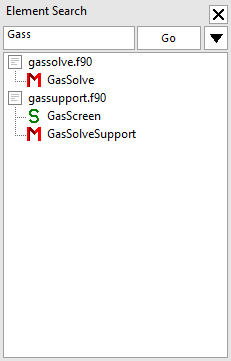

Gfortran -c -o src/tests/csv_write_ src/tests/csv_write_test.f90 Gfortran -o src/tests/csv_test.exe src/tests/csv_ libcsv.a Gfortran -c -o src/tests/csv_ src/tests/csv_test.f90 Gfortran -o src/tests/csv_read_test.exe src/tests/csv_read_ libcsv.a Gfortran -c -o src/tests/csv_read_ src/tests/csv_read_test.f90 Gfortran -c -o src/csv_ src/csv_module.F90Īr rcs libcsv.a src/csv_ src/csv_ src/csv_ src/csv_

Gfortran -c -o src/csv_ src/csv_utilities.f90 Gfortran -c -o src/csv_ src/csv_parameters.f90 Gfortran -c -o src/csv_ src/csv_kinds.f90 Invoking make should build the static library and the test executables as
#PROJECT OPTIONS SIMPLY FORTRAN CODE#
Src/csv_ : $( csv_utilities.mod ) src/csv_ : $( csv_kinds.mod ) src/csv_ : $( csv_parameters.mod ) src/csv_ : $( csv_kinds.mod ) src/csv_ : $( csv_kinds.mod ) src/csv_ : $( csv_parameters.mod ) src/tests/csv_read_ : $( csv_module.mod ) src/tests/csv_ : $( csv_module.mod ) src/tests/csv_write_ : $( csv_module.mod ) # Cleanup, filter to avoid removing source code by accident clean : $(RM ) $(filter %.o, $(OBJS ) $(TEST_OBJS )) $(filter %.exe, $(TEST_EXE )) $(LIB ) $(wildcard *.mod ) # Define all module interdependencies csv_kinds.mod := src/csv_Ĭsv_parameters.mod := src/csv_Ĭsv_utilities.mod := src/csv_ # Create object files from Fortran source $(OBJS) $(TEST_OBJS) : %. # Link the test executables $(TEST_EXE) : %. PHONY : all clean all : $( LIB ) $( TEST_EXE ) # Create the static library from the object files $(LIB) : $( OBJS ) $(AR ) $^ o, $(TEST_SRCS )) LIB := $(patsubst %, lib%.a, $(NAME )) TEST_EXE := $(patsubst %.f90, %.exe, $(TEST_SRCS )) # Declare all public targets. # Create lists of the build artefacts in this project OBJS := $(addsuffix. TEST_SRCS := src/tests/csv_read_test.f90 \ # List of all source files SRCS := src/csv_kinds.f90 \ # Disable the default rules MAKEFLAGS += -no-builtin-rules -no-builtin-variables Make, but also serve as demonstration of useful and interesting features. This guide should present a general recommended style to write Package index, which (at the time of writing) use build systems other For this course we will use real world examples from the If you think make is suitable for your needs, than you can start writing The effort needed to test and document those Those introduceĭependencies and possible sources of errors. To dynamically or statically generate your Makefile. Makefile and would they be able to debug or add features? How much time do you expect them to spend learning your On your project who may not be familiar with make. You can work with your Makefile, but think about other developers Maintaining your Makefile instead of developing your source code. You might find yourself spending a significant amount of time writing and Means you are responsible for the entire build process, and you have to specify the rules for every detail of your project.
#PROJECT OPTIONS SIMPLY FORTRAN FULL#
While make gives you full control over the build process, it also Not all might support the features you want to use. That said, there are also different flavors of make available, Make is a Unix tool and might give you a hard time when porting to non-Unix This chapter gives ideasĪnd strategies to scale make for larger projects.īefore going into detail with make, consider a few points: Matrix multiplication, dot product, and array shifts Parallel programming using co_arrays and co_indexed arrays

Manipulation and properties of numeric values Information about compiler and compiler options used for buildingĬontrolling and querying the current numeric model Managing libraries (static and dynamic libraries)


 0 kommentar(er)
0 kommentar(er)
